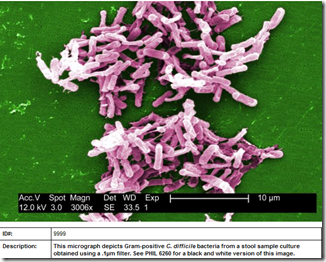
C. difficile – Credit CDC PHIL
UPDATE: Just as I posted this blog, Maryn McKenna posted her take on this study, which you can read at Fecal Transplants: A Clinical Trial Confirms How Well They Work
# 6863
In December of 2011 I reviewed some of the early history of using donor feces to resolve C. difficile infections, and invited my readers to read a post by Maryn McKenna’s called Fecal Transplants: They Work, the Regulations Don’t.
Clostridium difficile – or C. diff – is a bacterial intestinal infection which claims tens of thousands of lives each year, and is – as the name implies – very difficult to treat.
Usually brought on by the use of antibiotics - which kill off good gut bacteria along with the bad guys – C. diff can produce prolonged, and often life threatening bouts of diarrhea.
The idea behind a `fecal transplant’ is the re-introduction of good bacteria to afflicted patient’s gut biome.
Today the NEJM has an original article showing a remarkable success rate using donor feces to resolve recurrent C. diff infections among a small group of mostly elderly patients in the Netherlands.
Doctors randomly selected C. diff patients to receive one of three therapies:
- An initial vancomycin regimen (500 mg orally four times per day for 4 days), followed by bowel lavage and subsequent infusion of a solution of donor feces through a nasoduodenal tube;
- a standard vancomycin regimen (500 mg orally four times per day for 14 days);
- or a standard vancomycin regimen with bowel lavage
The criteria for success was the resolution of diarrhea associated with C. difficile infection without relapse after 10 weeks.
Among patients receiving the combination vancomycin -fecal transplant treatments, 81% (n=13 of 16) saw a resolution of their C. diff diarrhea symptoms after one infusion.
Of the remaining three, two responded after a second infusion (total success rate 15 of 16, or 94%).
Success rates were more than triple that of patients who received vancomycin alone (4 of 13 patients or 31%), or vancomycin with lavage (3 of 13 patients or 23%).
Their conclusion:
The infusion of donor feces was significantly more effective for the treatment of recurrent C. difficile infection than the use of vancomycin.
The article, with considerable detail, is available at the NEJM.
Duodenal Infusion of Donor Feces for Recurrent Clostridium difficile
Els van Nood, M.D., Anne Vrieze, M.D., Max Nieuwdorp, M.D., Ph.D., Susana Fuentes, Ph.D., Erwin G. Zoetendal, Ph.D., Willem M. de Vos, Ph.D., Caroline E. Visser, M.D., Ph.D., Ed J. Kuijper, M.D., Ph.D., Joep F.W.M. Bartelsman, M.D., Jan G.P. Tijssen, Ph.D., Peter Speelman, M.D., Ph.D., Marcel G.W. Dijkgraaf, Ph.D., and Josbert J. Keller, M.D., Ph.D.
January 16, 2013DOI: 10.1056/NEJMoa1205037
Two points I’m sure everyone is curious about. How donors were screened, and any adverse side effects reported:
The authors describe the screening process this way:
Donors (<60 years of age) were volunteers who were initially screened using a questionnaire addressing risk factors for potentially transmissible diseases. Donor feces were screened for parasites (including Blastocystis hominis and Dientamoeba fragilis), C. difficile, and enteropathogenic bacteria. Blood was screened for antibodies to HIV; human T-cell lymphotropic virus types 1 and 2; hepatitis A, B, and C; cytomegalovirus; Epstein–Barr virus; Treponema pallidum; Strongyloides stercoralis; and Entamoeba histolytica. A donor pool was created, and screening was repeated every 4 months. Before donation, another questionnaire was used to screen for recent illnesses.
As far as adverse events were concerned:
Immediately after donor-feces infusion, most patients (94%) had diarrhea. In addition, cramping (31%) and belching (19%) were reported (Table 2). In all patients, these symptoms resolved within 3 hours.
During follow-up, three patients who were treated with donor feces (19%) had constipation. No other adverse events related to study treatment were reported.
For patients afflicted with C. diff, but who cannot get past the `ick’ factor of receiving donor feces, there may be hope on the horizon.
Researchers in Ontario, Canada have developed a `synthetic stool’, containing 33 types of `good’ bacteria, they call RePOOPulate.
Results of limited testing (only two patients) were recently published in the open access journal Microbiome.
Stool substitute transplant therapy for the eradication of Clostridium difficile infection: ‘RePOOPulating’ the gut
Elaine O Petrof1*†, Gregory B Gloor2†, Stephen J Vanner1, Scott J Weese3, David Carter4, Michelle C Daigneault5, Eric M Brown5, Kathleen Schroeter5 and Emma Allen-Vercoe5
Conclusion
This proof-of-principle study demonstrates that a stool substitute mixture comprising a multi-species community of bacteria is capable of curing antibiotic-resistant C. difficile colitis. This benefit correlates with major changes in stool microbial profile and these changes reflect isolates from the synthetic mixture.
For now, fecal transplants are not FDA approved, and questions remain over the safety of using donor feces.
If synthetic stools products can be shown to have a Darwinian advantage over C. diff bacteria in the human gut, it would go a long ways towards eliminating any concerns over the `origins of feces’.
Bad . . . I know.
But If I didn’t use that line, someone else would have.